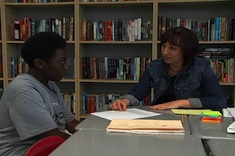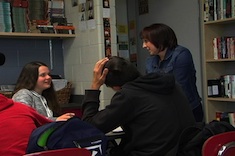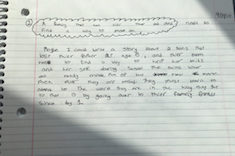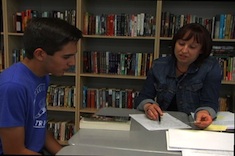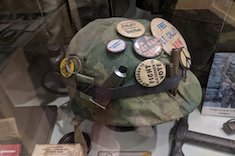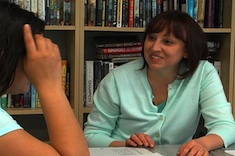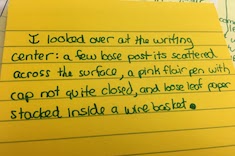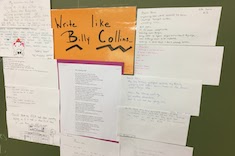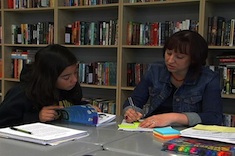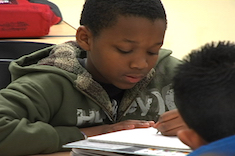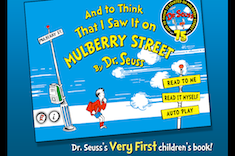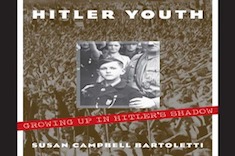8th
Latest Content
Honoring Student Identity
Christy Rush-Levine considers how to communicate to all students that their presence and their identities are valued and appreciated.
Engaging Students with Humor
Mark Levine finds humor is the “secret sauce” in engaging middle school students and including introverts in the classroom community.
Read Alouds in Content Classes
Mark Levine explains the many ways read alouds can enhance and deepen learning for middle school students in content areas like social studies and science.
Matching Evidence and Claims in Writing
Christy Rush-Levine confers with Brendan about his literary analysis and how to match evidence and claims. She has him talk through his understanding of the text, using the oral rehearsal to plan his writing.
Choice in Literacy Workshops
What makes choice authentic in literacy workshops? Christy Rush-Levine grapples with this tough question that leads to changes in her instruction.
Three Things Digital Tools Have Taught Me About Feedback
Christy Rush-Levine discovers that a move to digital feedback reveals many important truths about her middle school students, including insights into the effect of grades on how learners view response to their work.
Management and Middle School Workshops
Christy Rush-Levine lowers the tension level in her class over management issues by moving from irritation to curiosity, using her “inner chimpanzee” voice.
Lessons and Minilessons: What’s the Difference?
What’s the difference between a lesson and a minilesson? Christy Rush-Levine finds that flexibility is just as important as length in making minilessons work well.
Sparking Ideas for Realistic Fiction
Tara Barnett and Kate Mills explain how they use examples from YA authors of how to mine everyday life for powerful ideas. They then help students move from ideas to blurbs as they start their realistic fiction drafts.
Conferring over Motivation and Genre
Christy Rush-Levine confers with Griffin over his reading responses. They consider the differences between dystopian literature and realistic fiction, as well as what motivates characters.
Building Interest Through Artifacts
Mark Levine has many students who haven’t traveled much more than 100 miles from home. He makes history come to life for them by bringing artifacts into his middle school classroom.
Literary Analysis in Eighth Grade: Conferring
Christy Rush-Levine helps Alyssa draft her literary analysis essay.
Navigating the Interpretation Process
Tammy Mulligan shares how she introduces students to the process of interpreting literature at different grade and developmental levels.
Student Ownership of Literary Analysis
Christy Rush-Levine shares the strategies she uses to help her middle school students take ownership of their literary analysis essays.
Studying Craft and Punctuation in Sentences from Read Alouds
Tara Barnett and Kate Mills share the power of teaching writer’s craft in bite-sized chunks, through careful study of mentor sentences in read alouds.
Reading Conference: Connections to Home
In this conference in Christy Rush-Levine’s eighth-grade classroom, Jaden is reading a book that mixes math with basketball, an activity he enjoys at home.
Keeping Parent Communication Open in Middle School
Tara Barnett and Kate Mills find that they have to change the way they think about connecting with families once students reach middle school.
Observing Skilled Readers
Mark Levine wonders why his most some of his most skilled readers take the most time to get through texts. So he asks them, and gets some fascinating answers he uses to assist struggling students.
Creating a Safe Space in Middle School
Christy Rush-Levine ponders what it means to create a safe space for all of her middle school students, and then makes some changes.
Poetry and Pastiche
Tara Barnett and Kate Mills introduce their middle school students to pastiche, a technique of mimicking the craft of favorite poems and poets.
Exploring Author’s Craft in Graphic Novels
Christy Rush-Levine finds her middle school students need more support and scaffolds to understand authors’ craft in graphic novels.
Pairing Video Clips with Text: The Great Depression
Mark Levine has his middle school students “closely read” paired videos as well as texts to ponder the value and accuracy of different historical sources.
Characters, Choices, and Graphic Novels: Eighth-Grade Reading Conference
Christy Rush-Levine confers with Nia over the graphic novel she is reading. They discuss the choices characters make.
Self-Esteem and Literacy: Understanding Jeff
Jeff is apathetic and unengaged. To help this middle school learner, Mark Levine needs to understand his history. Mark shows the power of interviews for connecting with struggling teen learners.
Collaborating for Understanding in Writing
Mark Levine realizes explaining expectations for an essay assignment over and over again isn’t working. But when he has students write in pairs for a portion of his workshop, magic happens.
Community Timeline Project
Katherine Sokolowski uses the Community Timeline Project to bring together students and older community members around history and writing. Includes a downloadable interview guide to help students record the interviewee’s life story.
Scaffolding Instruction in an Author Study
Christy Rush-Levine scaffolds her middle-school students’ understanding of craft moves by moving from short stories to novels when studying specific authors.
Magic Connections: Young Adult Literature in a Social Studies Class
Mark Levine shows how young adult literature is a potent tool to drive learning in his middle school social studies classroom.
The Freewrite Pause
Mark Levine finds his middle school students need more time to digest learning from brief articles. Freewriting provides the perfect pause for promoting more reflection and insight.
Whole-Class Reflection in Middle School
Mark Levine explains why whole-class reflection is an essential component of his middle school workshops.
Browse Content By
Type
Category
- Assessment Tools
- Big Fresh Archives
- Booklists
- Choice Numeracy
- Classroom Design
- Common Core
- Community Building
- Conferring
- Content Literacy
- Digital Literacy
- English Language Learners
- Equity
- Family Relations
- Free Samples
- Guiding Groups
- Leadership
- Literacy Coaches
- Mentor Texts
- Minilessons
- New Teacher Mentors
- Podcasts
- Poetry
- Quote Collections
- Reading Strategies
- Self Care
- Struggling and Striving Learners
- Talking and Listening
- Teacher Study Groups
- Teaching Reading
- Teaching Writing
- Word Study and Vocabulary
Author
- Melissa Quimby
- Nawal Qarooni
- Gwen Blumberg
- Julie Cox
- The Lead Learners
- Hannah Tills
- Josie Stewart
- Ruth Metcalfe
- Mallory Messenger
- Becca Burk
- Jodie Bailey
- Vivian Chen
- Mary Brower
- Tiffany Abbott Fuller
- Stephanie Affinito
- Ruth Ayres
- Leigh Anne Eck
- Heather Fisher
- Shari Frost
- Julie Johnson
- Suzy Kaback
- Gigi McAllister
- Shirl McPhillips
- Melanie Meehan
- Cathy Mere
- Debbie Miller
- Tara Barnett and Kate Mills
- Tammy Mulligan
- Dana Murphy
- Bitsy Parks
- David Pittman
- Brenda Power
- Heather Rader
- Matt Renwick
- Mandy Robek
- Christy Rush-Levine
- Gretchen Schroeder
- Jen Schwanke
- Brian Sepe
- Katherine Sokolowski
- Stella Villalba
- Jennifer Vincent
Grade Level
Choice Literacy Membership
Articles
Get full access to all Choice Literacy article content
Videos
Get full access to all Choice Literacy video content
Courses
Access Choice Literacy course curriculum and training




